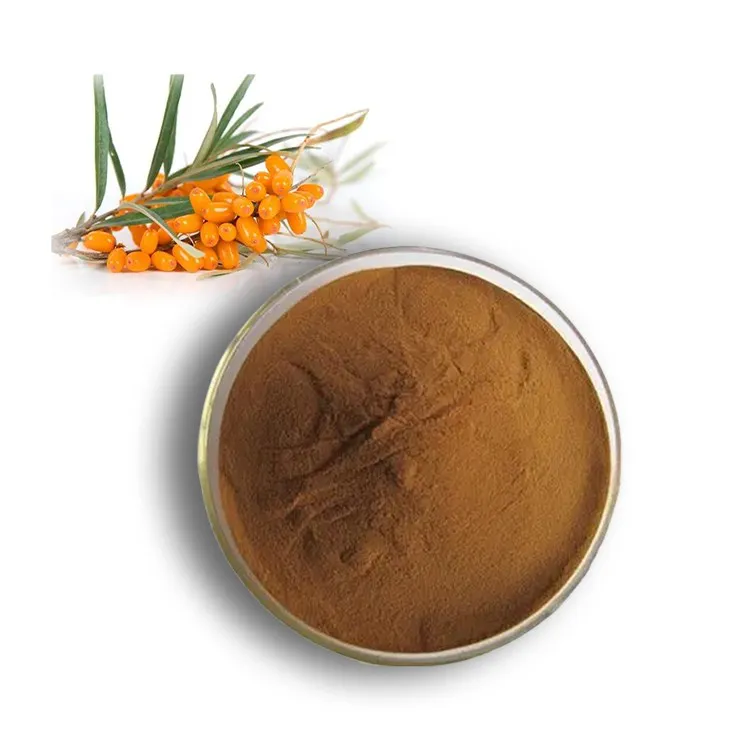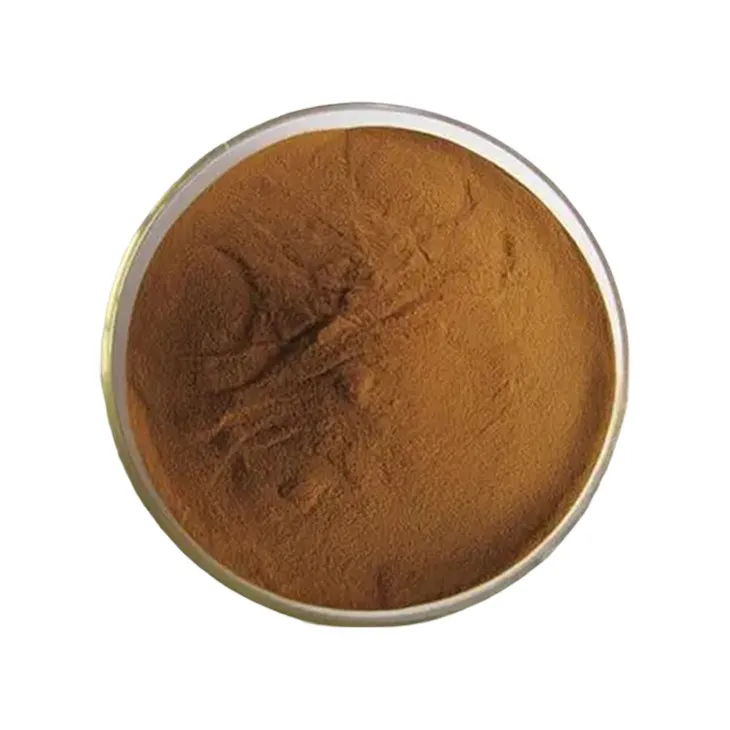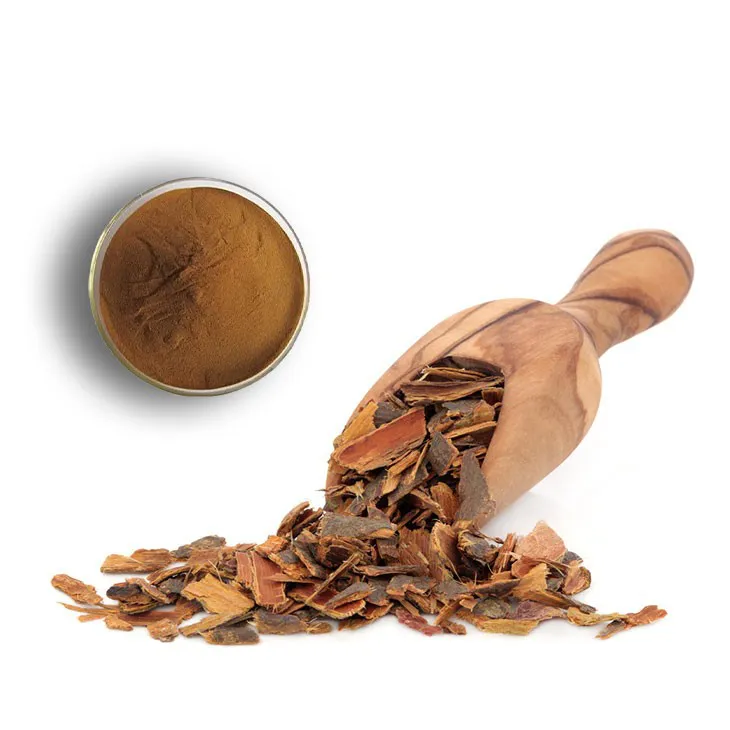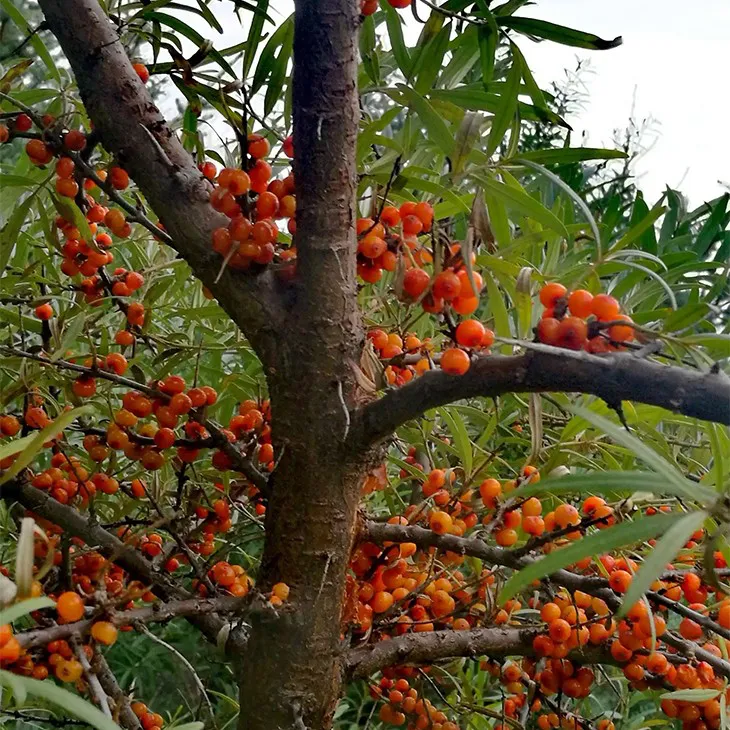- 0086-571-85302990
- sales@greenskybio.com
Organic Supercritical CO2 Extraction of Seabuckthorn Bark Extracts
2024-12-01

Introduction
The extraction of seaBuckthorn bark extracts using the organic supercritical CO2 method is a topic of great significance in the fields of natural product extraction and utilization. Seabuckthorn, a remarkable plant species, has been recognized for its potential in various applications. Its bark, in particular, is a rich source of bioactive compounds.
Supercritical CO2 extraction is a modern and advanced technique that has gained popularity due to its numerous advantages over traditional extraction methods. This extraction process is not only efficient but also highly compatible with the requirements of obtaining high - quality, pure extracts for different industries.

Supercritical CO2 Extraction: An Overview
Supercritical CO2 extraction operates under specific conditions where carbon dioxide is maintained in its supercritical state. In this state, CO2 exhibits properties that are intermediate between a gas and a liquid. This unique state allows it to penetrate the seabuckthorn bark effectively and dissolve the desired bioactive compounds.
One of the key advantages of supercritical CO2 extraction is its selectivity. It can be precisely adjusted to target specific compounds within the seabuckthorn bark. For example, the extraction parameters can be set to preferentially extract flavonoids or polyphenols. This selectivity is crucial in isolating the bioactive components with the highest potential value.
Another important aspect is the absence of harmful residues. Traditional extraction methods may involve the use of organic solvents that can leave behind traces of potentially harmful substances. In contrast, supercritical CO2 extraction uses carbon dioxide, which is a non - toxic, non - flammable gas. Once the extraction is complete, the CO2 can be easily removed from the extract, leaving behind a pure product.

Bioactive Compounds in Seabuckthorn Bark
Seabuckthorn bark is a treasure trove of bioactive compounds. Flavonoids are one of the major groups present in seabuckthorn bark. Flavonoids are known for their antioxidant properties. They can scavenge free radicals in the body, which are associated with various diseases such as cancer, heart disease, and aging - related disorders.
Polyphenols are also abundant in seabuckthorn bark. These compounds have a wide range of biological activities. They can act as anti - inflammatory agents, reducing inflammation in the body. Inflammation is a key factor in many chronic diseases, including arthritis and inflammatory bowel diseases.
In addition to flavonoids and polyphenols, seabuckthorn bark may also contain other valuable substances such as tannins. Tannins have been studied for their potential antimicrobial and astringent properties. These properties make seaBuckthorn bark extracts potentially useful in the development of natural preservatives and skin - care products.

The Organic Nature of the Extraction Process
The organic nature of the supercritical CO2 extraction process is of great importance. Organic extraction implies that the process adheres to strict quality and environmental standards.
Firstly, it ensures the purity of the extract. Since the extraction is carried out in a controlled environment using supercritical CO2, there is less contamination from external sources. This results in a high - quality extract with a high concentration of the desired bioactive compounds.
Secondly, the organic extraction process is more environmentally friendly compared to some traditional extraction methods. The use of CO2, a natural gas, reduces the emission of harmful chemicals and solvents into the environment. This is in line with the growing trend towards sustainable and green extraction techniques in the industry.

Applications in the Pharmaceutical Industry
The seaBuckthorn bark extracts obtained through organic supercritical CO2 extraction have significant potential in the pharmaceutical industry.
Due to their antioxidant and anti - inflammatory properties, these extracts can be used in the development of drugs for treating chronic diseases. For example, they may be incorporated into formulations for treating arthritis, where the anti - inflammatory action of the polyphenols can help reduce joint pain and inflammation.
The bioactive compounds in seabuckthorn bark extracts may also have potential in cancer prevention and treatment. Some flavonoids have been shown to have anti - cancer properties in vitro and in animal studies. However, further research is needed to fully understand their mechanisms of action and develop effective pharmaceutical products.
Applications in the Cosmetic Industry
In the cosmetic industry, seabuckthorn bark extracts are highly sought after.
Their antioxidant properties make them ideal for use in anti - aging skincare products. Free radicals are known to cause damage to the skin, leading to wrinkles and premature aging. The flavonoids and polyphenols in seabuckthorn bark extracts can help combat these effects, leaving the skin looking younger and more radiant.
Additionally, the potential antimicrobial properties of tannins in the extracts can be utilized in the development of natural preservatives for cosmetics. This is important as consumers are increasingly demanding products that are free from synthetic preservatives.
Applications in the Food Industry
Seabuckthorn bark extracts can also find applications in the food industry.
Their antioxidant properties can be used to preserve food products. Oxidation is a major cause of food spoilage, and the addition of seabuckthorn bark extracts can extend the shelf - life of foods. For example, they can be added to oils, where they prevent rancidity.
Moreover, the extracts can be used as natural flavor enhancers. They can add a unique flavor profile to food products, which can be appealing to consumers who are looking for natural and healthy alternatives.
Challenges and Future Directions
While organic supercritical CO2 extraction of seabuckthorn bark extracts has many advantages, there are also some challenges.
One of the main challenges is the cost of the extraction process. The equipment required for supercritical CO2 extraction is relatively expensive, which can limit its widespread use. However, as technology advances and economies of scale are achieved, the cost is expected to decrease.
Another challenge is the need for further research to fully understand the bioactive compounds in seabuckthorn bark and their mechanisms of action. This will require more in - depth studies, including clinical trials for potential pharmaceutical applications.
In the future, it is expected that the extraction process will be further optimized. This may involve improving the selectivity of the extraction to obtain even purer extracts. Additionally, new applications for seabuckthorn bark extracts may be discovered as research in related fields progresses.
Conclusion
Organic supercritical CO2 extraction of seabuckthorn bark extracts is a promising technique with numerous benefits. It offers a way to obtain high - quality extracts rich in bioactive compounds without leaving harmful residues.
The potential applications in the pharmaceutical, cosmetic, and food industries are vast. However, challenges such as cost and the need for further research need to be addressed. Overall, seabuckthorn bark extracts obtained through this method have the potential to contribute significantly to the development of natural products in various industries.
FAQ:
What are the main advantages of organic supercritical CO2 extraction for seabuckthorn bark?
The main advantages include precisely targeting and isolating bioactive compounds without leaving harmful residues. It also enhances the purity and value of the extract, making it suitable for various industries like pharmaceutical, cosmetic, and food.
What bioactive compounds can be obtained from seabuckthorn bark through this extraction method?
Flavonoids, polyphenols, etc. can be obtained. These compounds have potential antioxidant, anti - inflammatory, and other health - promoting properties.
Why is the organic supercritical CO2 extraction considered environmentally - friendly?
It is considered environmentally - friendly because it doesn't leave harmful residues. Supercritical CO2 is a clean solvent, which reduces the environmental impact compared to some traditional extraction methods.
How is the quality of the seabuckthorn bark extract obtained by this method?
The quality is high as the method can precisely isolate bioactive compounds. Also, the organic nature of the extraction process further enhances the purity of the extract.
What industries can the seabuckthorn bark extract obtained by this method be applied to?
It can be applied to the pharmaceutical, cosmetic, and food industries due to its high quality and valuable bioactive compounds.
Related literature
- Supercritical Fluid Extraction of Bioactive Compounds from Seabuckthorn"
- "Organic Extraction Techniques for Seabuckthorn - Derived Products"
- "The Role of Supercritical CO2 in Extracting Valuable Substances from Seabuckthorn Bark"
- ▶ Hesperidin
- ▶ citrus bioflavonoids
- ▶ plant extract
- ▶ lycopene
- ▶ Diosmin
- ▶ Grape seed extract
- ▶ Sea buckthorn Juice Powder
- ▶ Beetroot powder
- ▶ Hops Extract
- ▶ Artichoke Extract
- ▶ Reishi mushroom extract
- ▶ Astaxanthin
- ▶ Green Tea Extract
- ▶ Curcumin Extract
- ▶ Horse Chestnut Extract
- ▶ Other Problems
- ▶ Boswellia Serrata Extract
- ▶ Resveratrol Extract
- ▶ Marigold Extract
- ▶ Grape Leaf Extract
- ▶ blog3
- ▶ Aminolevulinic acid
- ▶ Cranberry Extract
- ▶ Red Yeast Rice
- ▶ Red Wine Extract
-
Acerola Extract
2024-12-01
-
Chasteberry Extract
2024-12-01
-
Black Garlic Extract
2024-12-01
-
Lemon Juice Powder
2024-12-01
-
Curcumin
2024-12-01
-
Okra Extract
2024-12-01
-
White Peony Extract
2024-12-01
-
Angelica sinensis extract
2024-12-01
-
Europen Bilberry Extract
2024-12-01
-
Yellow Pine Extract
2024-12-01





















